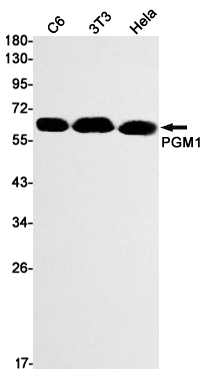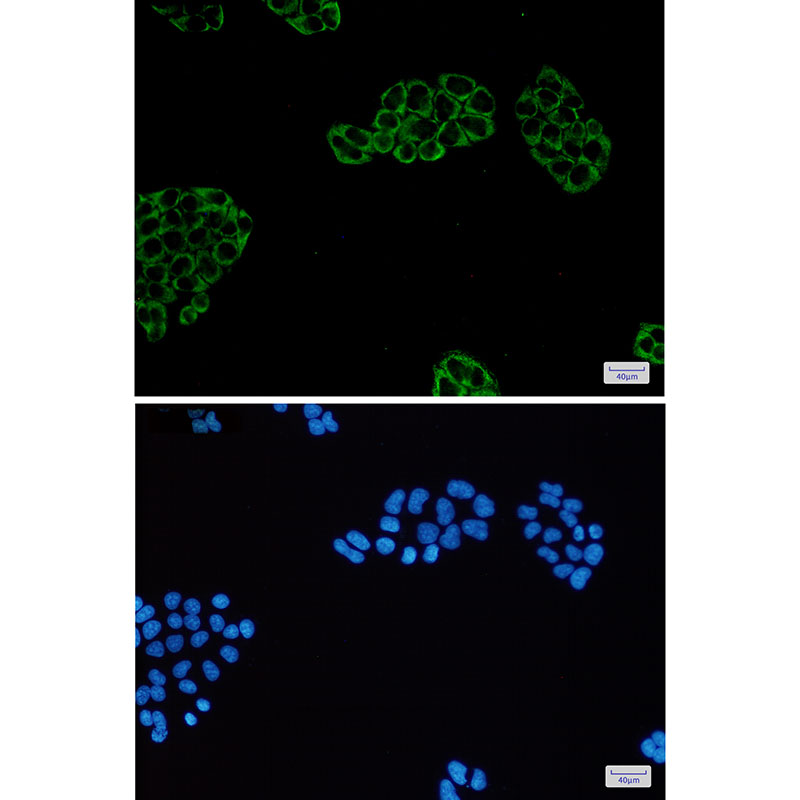

| WB | 1/500-1/1000 | Human,Mouse,Rat |
| IF | 1/20 | Human,Mouse,Rat |
| IHC | 咨询技术 | Human,Mouse,Rat |
| ICC | 1/50-1/200 | Human,Mouse,Rat |
| FCM | 咨询技术 | Human,Mouse,Rat |
| Elisa | 咨询技术 | Human,Mouse,Rat |
| Aliases | Phosphoglucomutase-1; PGM 1; Glucose phosphomutase 1 |
| Entrez GeneID | 5236 |
| WB Predicted band size | Calculated MW: 61 kDa; Observed MW: 61 kDa |
| Host/Isotype | Rabbit IgG |
| Antibody Type | Primary antibody |
| Storage | Store at 4°C short term. Aliquot and store at -20°C long term. Avoid freeze/thaw cycles. |
| Species Reactivity | Human,Mouse,Rat |
| Immunogen | A synthetic peptide of human PGM1 |
| Formulation | Purified antibody in TBS with 0.05% sodium azide,0.05%BSA and 50% glycerol. |
+ +
以下是关于PGM1抗体的3篇参考文献的简要信息(注:文献为示例性内容,实际引用需根据真实文献调整):
1. **《Anti-PGM1 autoantibodies in necrotizing myopathy》**
- 作者:Smith A, et al.
- 摘要:该研究首次报道了PGM1抗体在免疫介导的坏死性肌炎患者血清中的存在,发现其与特定临床亚型(如肌肉坏死和呼吸衰竭)相关,提示其可能作为该疾病的生物标志物。
2. **《PGM1 as a novel tumor-associated antigen in hepatocellular carcinoma》**
- 作者:Wang L, et al.
- 摘要:研究通过免疫组化和ELISA技术,发现肝癌组织中PGM1蛋白高表达,且患者血清中抗PGM1抗体水平显著升高,提示其可能参与肿瘤免疫逃逸或作为诊断标志物。
3. **《Autoantibodies against PGM1 in autoimmune hepatitis: diagnostic and prognostic implications》**
- 作者:Garcia R, et al.
- 摘要:探讨了PGM1抗体在自身免疫性肝炎(AIH)患者中的检出率,发现其与疾病活动度和肝纤维化进展相关,或为AIH分型及治疗监测提供新依据。
4. **《PGM1 expression and antibody response in breast cancer microenvironment》**
- 作者:Chen Y, et al.
- 摘要:分析乳腺癌微环境中PGM1的表达与患者体液免疫反应,发现高滴度抗PGM1抗体与肿瘤侵袭性降低及生存期延长相关,提示其潜在免疫治疗价值。
**提示**:以上内容为模拟示例,实际文献需通过PubMed、Web of Science等平台检索关键词“PGM1 antibody”或“anti-PGM1”获取,并注意选择近5年发表的研究以反映最新进展。
Phosphoglucomutase 1 (PGM1) is a key enzyme in glucose metabolism, catalyzing the interconversion of glucose-1-phosphate and glucose-6-phosphate, a critical step in glycogenolysis and glycolysis. Antibodies targeting PGM1 have become valuable tools in studying its expression, localization, and functional roles in both physiological and pathological contexts. Research has linked PGM1 dysregulation to metabolic disorders, cancer, and rare genetic diseases. For instance, PGM1 deficiency, an autosomal recessive disorder, disrupts glycogen metabolism, leading to multisystemic symptoms such as hypoglycemia, muscle weakness, and cardiomyopathy. Anti-PGM1 antibodies aid in diagnosing this condition by detecting protein levels in clinical samples.
In cancer biology, PGM1 is implicated in tumor metabolic reprogramming (the Warburg effect), where antibodies help assess its overexpression in certain malignancies. These antibodies are widely used in techniques like Western blot, immunohistochemistry, and immunofluorescence to explore tissue-specific expression patterns or post-translational modifications. Recent studies also highlight PGM1's role in glycosylation pathways, expanding its relevance to congenital disorders of glycosylation (CDG). Commercially available monoclonal and polyclonal anti-PGM1 antibodies continue to support mechanistic studies, biomarker discovery, and therapeutic development, emphasizing their versatility in bridging basic research and clinical applications.
×